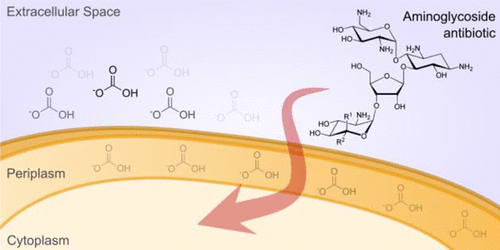当前位置:
X-MOL 学术
›
ACS Infect. Dis.
›
论文详情
Our official English website, www.x-mol.net, welcomes your
feedback! (Note: you will need to create a separate account there.)
Bicarbonate Alters Bacterial Susceptibility to Antibiotics by Targeting the Proton Motive Force
ACS Infectious Diseases ( IF 4.0 ) Pub Date : 2017-12-21 00:00:00 , DOI: 10.1021/acsinfecdis.7b00194 Maya A. Farha 1 , Shawn French 1 , Jonathan M. Stokes 1 , Eric D. Brown 1
ACS Infectious Diseases ( IF 4.0 ) Pub Date : 2017-12-21 00:00:00 , DOI: 10.1021/acsinfecdis.7b00194 Maya A. Farha 1 , Shawn French 1 , Jonathan M. Stokes 1 , Eric D. Brown 1
Affiliation

|
The antibacterial properties of sodium bicarbonate have been known for years, yet the molecular understanding of its mechanism of action is still lacking. Utilizing chemical–chemical combinations, we first explored the effect of bicarbonate on the activity of conventional antibiotics to infer on the mechanism. Remarkably, the activity of 8 classes of antibiotics differed in the presence of this ubiquitous buffer. These interactions and a study of mechanism of action revealed that, at physiological concentrations, bicarbonate is a selective dissipater of the pH gradient of the proton motive force across the cytoplasmic membrane of both Gram-negative and Gram-positive bacteria. Further, while components that make up innate immunity have been extensively studied, a link to bicarbonate, the dominant buffer in the extracellular fluid, has never been made. Here, we also explored the effects of bicarbonate on components of innate immunity. Although the immune response and the buffering system have distinct functions in the body, we posit there is interplay between these, as the antimicrobial properties of several components of innate immunity were enhanced by a physiological concentration of bicarbonate. Our findings implicate bicarbonate as an overlooked potentiator of host immunity in the defense against pathogens. Overall, the unique mechanism of action of bicarbonate has far-reaching and predictable effects on the activity of innate immune components and antibiotics. We conclude that bicarbonate has remarkable power as an antibiotic adjuvant and suggest that there is great potential to exploit this activity in the discovery and development of new antibacterial drugs by leveraging testing paradigms that better reflect the physiological concentration of bicarbonate.
中文翻译:

碳酸氢盐通过靶向质子动力改变细菌对抗生素的敏感性
碳酸氢钠的抗菌性能已为人所知,但仍缺乏对其作用机理的分子理解。利用化学-化学组合,我们首先探讨了碳酸氢盐对常规抗生素活性的影响,以推测其作用机理。值得注意的是,在这种普遍存在的缓冲液存在下,8种抗生素的活性有所不同。这些相互作用和作用机理的研究表明,在生理浓度下,碳酸氢盐是跨革兰氏阴性和革兰氏阳性细菌细胞质膜的质子动力pH梯度的选择性消耗物。此外,虽然已经广泛研究了组成先天性免疫的成分,但与碳酸氢盐(细胞外液中的主要缓冲液)的联系 从来没有做过。在这里,我们还探讨了碳酸氢盐对先天免疫成分的影响。尽管免疫反应和缓冲系统在体内具有独特的功能,但我们认为它们之间存在相互作用,因为生理浓度的碳酸氢盐可增强先天免疫的几种成分的抗菌性能。我们的发现暗示碳酸氢盐在防御病原体方面是宿主免疫力被忽视的增强剂。总体而言,碳酸氢盐的独特作用机制对先天免疫成分和抗生素的活性具有深远和可预测的影响。
更新日期:2017-12-21
中文翻译:

碳酸氢盐通过靶向质子动力改变细菌对抗生素的敏感性
碳酸氢钠的抗菌性能已为人所知,但仍缺乏对其作用机理的分子理解。利用化学-化学组合,我们首先探讨了碳酸氢盐对常规抗生素活性的影响,以推测其作用机理。值得注意的是,在这种普遍存在的缓冲液存在下,8种抗生素的活性有所不同。这些相互作用和作用机理的研究表明,在生理浓度下,碳酸氢盐是跨革兰氏阴性和革兰氏阳性细菌细胞质膜的质子动力pH梯度的选择性消耗物。此外,虽然已经广泛研究了组成先天性免疫的成分,但与碳酸氢盐(细胞外液中的主要缓冲液)的联系 从来没有做过。在这里,我们还探讨了碳酸氢盐对先天免疫成分的影响。尽管免疫反应和缓冲系统在体内具有独特的功能,但我们认为它们之间存在相互作用,因为生理浓度的碳酸氢盐可增强先天免疫的几种成分的抗菌性能。我们的发现暗示碳酸氢盐在防御病原体方面是宿主免疫力被忽视的增强剂。总体而言,碳酸氢盐的独特作用机制对先天免疫成分和抗生素的活性具有深远和可预测的影响。









































 京公网安备 11010802027423号
京公网安备 11010802027423号